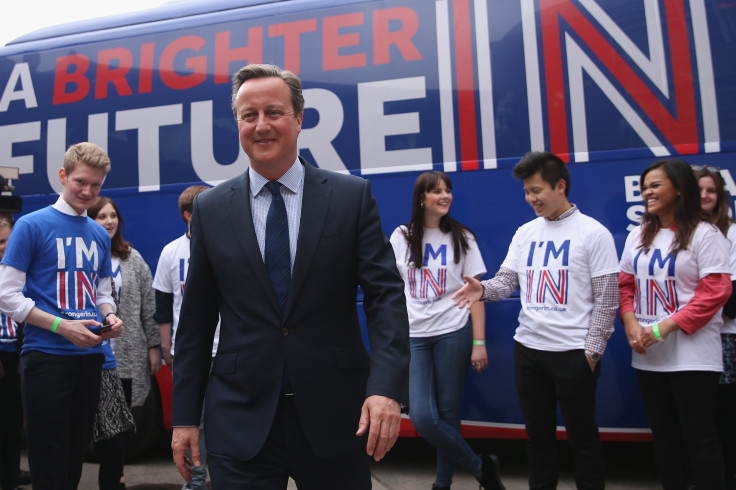London Mayor Elections 2016: Amid Tight Brexit Polls, Pro-EU Sadiq Khan Poised For Victory

As residents of London voted for a new mayor Thursday, polls showed Labour Party Member of Parliament Sadiq Khan was set to emerge victorious. The 45-year-old native Londoner has described himself as many things in the run-up to the campaign: He is the son of a Pakistani bus driver, a Muslim, a human rights advocate and not just a Brit but a dedicated European who favors the U.K. staying in the European Union.
With the referendum on the U.K. leaving the EU looming June 23, a so-called Brexit has become a prominent topic of debate leading up to the London mayoral election, in which Khan is facing off against pro-leave politician Zac Goldsmith to become the leader of the nation’s capital. While the London mayor exhibits limited power over the outcome of the referendum, a pro-Brexit mayor would have been seen as a symbolic defeat both for the Prime Minister David Cameron and for his entire pro-EU campaign, experts said. London has historically been heavily integrated into the EU financial and political system as well as statistically anti-Brexit.
“It’s crucial [for the EU campaign] that Goldsmith won’t be winning,” said Charles Lichfield, an EU analyst for risk consultancy Eurasia, saying Khan’s win is “certainly not something that the pro-Brexiters could use.”

Nearly 60 percent of Londoners who responded to a recent YouGov poll said they supported the U.K. staying in the EU. London has long been considered not only an international capital but a European one where EU nationals from across the continent live, work and study. With the London stock exchange and a thriving financial services sector, the capital is a financial hub that facilitates trade within the EU and beyond, and many citizens have expressed fear the city would lose some of its status and economic standing.
The debate over a Brexit centers on national sovereignty, security and economic strength. Supporters of the U.K. leaving the EU say the country would be better able to control its national borders without constraints from the EU while maintaining London would keep its economic prowess with or without the EU trading bloc. Proponents of staying in the EU argue the country’s membership is part of what has contributed to security and a thriving economy. The margin between the two camps has remained tight in the weeks leading up to the June vote, and the latest results from the Financial Times’ Brexit poll tracker — which takes the average of recent polling data — put support for remaining in the EU at 46 percent, and support for leaving at 43 percent.
If Goldsmith wins — a seemingly unlikely possibility as Khan was leading according to the most recent polling information — pro-Brexit campaigners would have been able to point to London as a symbol of the necessity for a Brexit, arguing if the European hub could recognize the necessity of leaving Europe, then everyone could, Lichfield explained.
Current London Mayor Boris Johnson came out in favor of a Brexit in February, going against the stance both of his Conservative Party and of the prime minister, a close political ally. A pro-Europe London mayor such as Khan would complete a pro-European trifecta of the prime minister, the London mayor and the chancellor of the exchequer — three of the most powerful positions in the U.K., all lobbying for the U.K. to stay in the EU.

Khan has been outspoken in his support of the U.K. staying in the EU, noting in particular the nearly 1 million EU nationals who reside in London and could be forced to leave in the event of a Brexit. While those EU nationals are not eligible to vote in the referendum, they are allowed to vote in the local election in London and are expected to be an important constituency.
“It is highly expected the turnout of these EU citizens will be higher than in previous elections,” said Benjamin Leruth, a sociological researcher at the University of Kent in the U.K. who has studied the rise of Euroskepticism. Not all EU nationals will vote for Khan, Leruth noted, as local issues such as transportation and public housing have taken on greater importance.
Still, Khan has touted his pro-Europe stance throughout the campaign and is expected to continue to lobby against a Brexit if elected mayor, serving as yet another powerful voice warning against the U.K. leaving the EU.
“Britain’s role in Europe is absolutely critical for all Londoners — supporting hundreds of thousands of jobs, and helping us keep Londoners safe,” Khan told the British newspaper the Evening Standard in February. “Our relationship with Europe is of even greater concern for the half-a-million European citizens in London,” he said before adding: “If Zac Goldsmith has his way and drags London out of Europe, they face massive uncertainty and even the prospect of having to leave London altogether.”
© Copyright IBTimes 2024. All rights reserved.






















